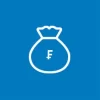Banks are steadily lowering the thresholds above which negative interest rates apply to private and savings account balances. Many already charge negative interest on balances exceeding 100,000 francs. The end of the negative interest environment is not in sight. In a representative survey by moneyland.ch, 1500 residents of Switzerland revealed how they are responding to negative interest rates or how they would react if their bank accounts where hit with negative interest in the future.
The majority of residents (61 percent) would transfer part of their money to different banks in order to keep their account balances below negative interest thresholds. More than half (51 percent) would consider closing their bank account if it were subjected to negative interest, or have already done so. Terminating their entire banking relationship is another widespread measure (37 percent). 44 percent also state that they would transfer assets to the pillar 3a to avoid negative interest.
| Measures to Avoid Paying Negative Interest |
Residents |
| Get informed using comparison services |
61% |
| Transfer part of assets to a different bank |
61% |
| Close bank account |
51% |
| Transfer money to the pillar 3a |
44% |
| Terminate banking relationship |
37% |
| Invest in real estate |
34% |
| Use investment solutions from current bank |
28% |
| Invest in securities with current bank |
28% |
| Hold money in a safe deposit box |
25% |
| Invest in securities with a different bank |
25% |
| Hold money at home |
23% |
| Invest in gold |
22% |
| Invest in cryptocurrencies |
14% |
Relatively less-common approaches include holding money at home (23 percent), buying cryptocurrencies (14 percent), and investing in gold (22 percent). On the whole though, Swiss do not shy away from investing. Around 56 percent of survey participants name at least one kind of investment (real estate, investment services, securities, gold, cryptocurrencies) as a possible measure to counter negative interest.
“That is beneficial for banks. One reason for introducing negative interest rates is that Swiss financial institutes hope to incentivize their customers to use their investment solutions. These are more lucrative for banks,” explains moneyland.ch CEO Benjamin Manz.
Men are more likely to react to negative interest
Men are more proactive in their responses, with an above-average ratio of men making use of all the measures included in the survey. The discrepancy between men and women is particularly large where investing is concerned. 37 percent of men invest, or would invest, with their current bank as a way to avoid paying negative interest, compared to just 20 percent of women. Women are also less likely than men to make use of other investment solutions or to hold wealth in gold than men are.
| Measures to Avoid Paying Negative Interest |
Men |
Women |
| Get informed using comparison services |
65% |
58% |
| Transfer part of assets to a different bank |
64% |
57% |
| Close bank account |
55% |
46% |
| Transfer money to the pillar 3a |
44% |
43% |
| Terminate banking relationship |
41% |
34% |
| Invest in real estate |
37% |
31% |
| Use investment solutions from current bank |
33% |
23% |
| Invest in securities with current bank |
37% |
20% |
| Hold money in a safe deposit box |
26% |
23% |
| Invest in securities with a different bank |
34% |
17% |
| Hold money at home |
24% |
22% |
| Invest in gold |
28% |
16% |
| Invest in cryptocurrencies |
17% |
11% |
Young adults are less likely to quit their banks
When it comes to terminating a banking relationship altogether, young adults between the ages of 18 and 25 are exceptionally cautious. Although more than a fourth of young adults (27 percent) would consider this option, or have done so, the average across all age groups combined is substantially higher (37 percent).
On the flip side, around a fifth of younger participants (21 percent) would consider investing in cryptocurrencies as a response to negative interest rates, or already have. At 14 percent, the average across all age groups is substantially lower. Only 7 percent of adults aged 50 or older would consider cryptocurrencies. “Young adults are clearly more open to new financial products like bitcoin,” observes Manz.
| Measures to Avoid Paying Negative Interest |
18-25 |
26-49 |
50-74 |
| Get informed using comparison services |
57% |
61% |
64% |
| Transfer part of assets to a different bank |
52% |
61% |
64% |
| Close bank account |
42% |
55% |
48% |
| Transfer money to the pillar 3a |
48% |
52% |
31% |
| Terminate banking relationship |
27% |
42% |
35% |
| Invest in real estate |
31% |
38% |
30% |
| Use investment solutions from current bank |
23% |
27% |
31% |
| Invest in securities with current bank |
28% |
27% |
30% |
| Hold money in a safe deposit box |
17% |
25% |
28% |
| Invest in securities with a different bank |
25% |
28% |
22% |
| Hold money at home |
23% |
26% |
20% |
| Invest in gold |
14% |
23% |
24% |
| Invest in cryptocurrencies |
21% |
17% |
7% |
French-speaking Swiss are more likely to ditch their banks
A number of geographical differences are also apparent. Residents of French-speaking Switzerland are more likely to close their account (54 percent) or stop using their bank altogether (43 percent) than their German-speaking counterparts (49 percent and 35 percent respectively). French-speaking Swiss, for their part, are less likely to invest in securities like stocks and ETFs.
Wealthy people are more likely to take action
Negative interest rates generally affect bank customers who have large account balances. That might explain why a disproportionately high number of wealthy people take steps to counter negative interest, or at least consider doing so. Nearly four-fifths (79 percent) of participants who have 300,000 francs or more in assets say that they would move part of their money to other banks or have already done so. Wealthier people are also more likely to close a bank account (59 percent) or terminate a banking relationship (44 percent).
Investing is also a common measure used by wealthy individuals to avoid paying negative interest. Individuals with 300,000 francs or more in assets are also much more likely to invest in securities and use the investment services offered by banks than people with less money. On the other hand, rich people are less likely to hold money at home or pay into the pillar 3a to avoid negative interest.
| Measures to Avoid Paying Negative Interest |
Up to 300'000 Francs |
More than 300'000 Francs |
| Get informed using comparison services |
61% |
74% |
| Transfer part of assets to a different bank |
59% |
79% |
| Close bank account |
51% |
59% |
| Transfer money to the pillar 3a |
46% |
41% |
| Terminate banking relationship |
37% |
44% |
| Invest in real estate |
34% |
43% |
| Use investment solutions from current bank |
27% |
40% |
| Invest in securities with current bank |
27% |
48% |
| Hold money in a safe deposit box |
25% |
28% |
| Invest in securities with a different bank |
25% |
41% |
| Hold money at home |
25% |
21% |
| Invest in gold |
23% |
28% |
| Invest in cryptocurrencies |
15% |
14% |
In addition to showing that wealthier individuals are more likely to take action, the survey also reveals that people with more wealth are more likely to use comparison services such as moneyland.ch. Nearly three-fourths (74 percent) of participants with fortunes of 300,000 francs or more would use comparison services to find solutions to negative interest, or already do. Across all wealth groups, an average of 61 percent of residents rely on comparison services.
“Those affected by negative interest rates on their bank accounts should get informed about alternatives before simply investing with solutions offered by their existing banks,” recommends Manz. “There are often more favorable investment services available, so comparing is worth it.”
Weitere Informationen:
Swiss Banks with Negative Interest Rates
What Are the Real Reasons for Negative Interest Rates at Swiss Banks?










